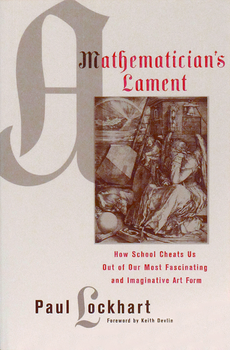Who could dislike a book on math with a chapter inside it called “High School Geometry: Instrument of the Devil”?
This is a radical and subversive work in the best sense; it’s brilliantly and comically irreverent toward that which is inane. What this particular author finds so inane is the standard K-12 math curriculum, and in a very concise and lucidly clear little treatise, he tells you why in surprisingly convincing terms. I say that as someone who liked my math education, who felt that calculus helped to show me the beauty of the universe–but Lockhart made me rethink the way I’d been compelled to spend much of my time up until that epiphany in calculus. He made me wonder if I might not have seen the same beauty or more beauty without so much time burned up in the acquisition of basically trivial skills.
More than anything else, A Mathematician’s Lament is a wholesale attack on learning by rote. “By concentrating on WHAT, and leaving out WHY, mathematics is reduced to an empty shell,” Lockhart writes. “Mathematics is THE ART OF EXPLANATION…. Math is not about following directions, it’s about making new directions.” Lockhart anticipates all the objections he’s likely to encounter as he assails the math education of “accurate yet mindless manipulation of symbols” (where students are trained to perform mathematical operations they don’t really understand and will not likely use ever again). And he dispenses with these objections in a Socratic dialogue between “Simplicio” and “Salviati,” who, not so coincidentally, are also the fictional interlocutors in Galileo’s 1632 Dialogue Concerning the Two Chief World Systems. In Galileo’s dialogue, Simplicio clings to the (then) traditional Ptolemaic view of the heavens, and Salviati advocates for Copernicus. In a way, the revolution Lockhart proposes feels just that radical and that necessary. It’s an argument that makes you feel very engaged with intellectual battles of our own moment in time. I hear the gears of intellectual history turning as I read Simplicio asking questions in defense of traditional education and Salviati answering them in a way that’s often hilariously blunt:
SIMPLICIO: But don’t we need people to learn those useful consequences of math? Don’t we need accountants and carpenters and such?
SALVIATI: How many people actually use any of this ‘practical math’ they supposedly learn in school? Do you think carpenters are out there using trigonometry? How many adults remember how to divide fractions, or solve a quadratic equation? Obviously the current practical training program isn’t working, and for good reason: it is excruciatingly boring, and nobody ever uses it anyway.
Lockhart certainly has the credibility to make any argument about math he wants. He’s a published mathematician and he’s lived his iconoclastic creed; he dropped out of college after a semester and, on the basis of his independent mathematical investigations, was admitted to graduate school at Columbia, from which he received a PhD in 1990.
I am a little puzzled by the extent of Lockhart’s hostility to applied math. I do understand that pure math research can or perhaps must proceed with the sole object of deducing new and interesting principles from propositions and definitions. But Newton invented calculus as a very precise language for describing the laws that govern change in the real world–i.e., for describing physics–and I think physics is pretty damn beautiful and awe-inspiring and important. Even the much-maligned “quadratic formula” is beautiful to me, because it describes the parabolic motion of projectiles under the influence of gravity. Furthermore, what’s so wrong with getting excited about the POWER that math gives to human beings to do interesting things, like walking on the moon or predicting how fast a drug will clear from the bloodstream. Finally, at the risk of exceeding my philosophical depth, I want to ask whether it’s really possible to pose mathematical problems and to consider abstractions without ANY reference to reality. Lockhart mentions an abstract problem of finding the shortest path from a point to a line and on to another point; but isn’t the whole notion of a “shortest path” inspired and given value by the experience of literally moving through space and caring when you get where you’re going?
But all in all, the degree of emphasis placed on applications (and the pedagogical value of real-life examples) is probably not as important as Lockhart’s bigger point. He wants us to witness truth and beauty, to enjoy creation and discovery, and to cease indulging those authorities who give us hoops to jump through simply because it makes their jobs easier. “I will not serve,” as Stephen Dedalus says!
Check out the book that, according to NPR’s math columnist, “is already a recognized landmark in the world of mathematics education” and you may get the same feeling Paul Lockhart gets from the “art” of pure mathematics—a feeling of penetration to what really matters.
